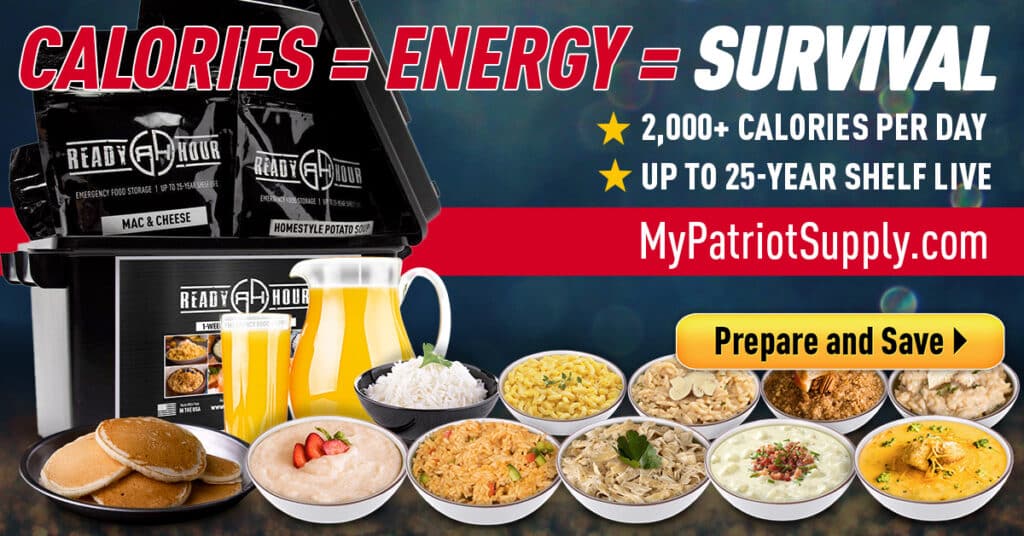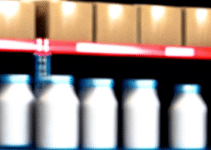Are you concerned about the expiration dates of your emergency food and water supplies? Understanding the true meaning behind expiration dates for emergency food and water can help alleviate your worries. Expiration dates signify the last day that a product is guaranteed to be at its peak quality, flavor, and nutritional value.
These dates should not be confused with best-by dates or sell-by dates, which are merely suggestions indicating when a product is at its best, but do not necessarily imply that it is unsafe to consume.
While expiration dates are not legally required, they serve as guidance for consumers.
Various factors, such
Click here to learn more about: ‘ patriot
Shelf life of emergency food and water
Another crucial aspect to consider when it comes to the shelf life of emergency food and water is the presence of proper labeling, including the best by date for emergency food and water. Each product should include clear information regarding its expiration date or best by date, which will enable consumers to understand the length of time they can depend on these supplies during emergencies.
It is essential to pay attention to these labels and make sure that you are consuming the items within the recommended timeframe.
By doing so, you can guarantee that you are always prepared with fresh and safe emergency food and water supplies
How Long Does Food Last
When it comes to stockpiling emergency food and water supplies, it is important to know how long they can last in storage and how to properly preserve them. The lifespan of emergency food can vary depending on the type and packaging.
For example, freeze-dried meals, canned goods, and MREs each have their own specific shelf life, ranging from a few months to several years.
Storing emergency food in cool, dry places can extend its longevity.
Similarly, emergency water, whether bottled or purified, also comes with expiration dates. Regularly check the expiration dates of your stockpiled emergency food and water to ensure their freshness and effectiveness.
Facts about Emergency Food and Water Storage
- Freeze-dried meals, canned goods, and MREs have varying shelf lives, ranging from a few months to several years.
- Storing emergency food in cool, dry places can extend its longevity.
- Emergency water, whether bottled or purified, also comes with expiration dates.
- Regularly checking the expiration dates of stockpiled emergency food and water ensures their freshness and effectiveness.
Tips for Storing Emergency Food
Properly storing emergency food supplies is crucial for ensuring their longevity and effectiveness during times of crisis. It is important to choose foods with long shelf lives and minimal preparation requirements.
Checking expiration dates and regularly rotating out older items is necessary to guarantee that you always have fresh and safe food available.
Storing your emergency food in a cool, dry, and dark environment is also essential to prevent any deterioration.
Make sure to include an ample supply of water, as it is vital for survival. By following these tips, you can be confident that your emergency food and water storage is well-maintained and ready for any unexpected situation
Ensuring Food and Water Safety
One important consideration in ensuring the safety of emergency food stock and emergency water stock is understanding their expiration dates, especially for canned food and bottled water. While these dates provide helpful guidelines for taste and quality, they should not be relied upon as definitive indicators of spoilage.
To determine if emergency food and water supplies are still safe to consume, it is important to use your senses of sight, smell, and taste to assess the products for any noticeable changes.
Proper storage conditions are also crucial for maintaining the freshness and quality of emergency supplies.
It is recommended to store them in cool, dry places away from heat and sunlight. Using airtight packaging can help prevent spoilage and maintain the safety of the supplies. When it comes to ensuring water safety, boiling is an effective method to kill harmful bacteria and safeguard your emergency water stock.
| Consideration | Guidelines |
|---|---|
| Expiration Dates | Not definitive indicators of spoilage |
| Use senses to assess | Look, smell, and taste for changes |
| Proper storage conditions | Cool, dry places away from heat and sunlight |
| Airtight packaging | Helps prevent spoilage and maintain safety |
| Boiling water | Effective method to kill harmful bacteria |
Best Practices for Preserving Food
Preserving food during emergencies is crucial for ensuring a reliable emergency food inventory. It is important to focus on emergency food rotation to maintain quality and freshness.
Regularly checking and rotating your emergency food supplies helps to keep them ready for any situation.
By consuming older items first and replacing them with new ones, you can ensure that your emergency food stock is always prepared.
Implementing an organized system for tracking expiration dates and rotation schedules is essential for effective emergency food preparation. Remember, a well-maintained emergency food kit can provide peace of mind and nourishment during challenging times
The Shelf Life of Water
Water is a precious resource that we rely on for our survival, and having an emergency water kit can ensure we are prepared for any unforeseen circumstances. It is crucial to understand the shelf life of water, especially in emergency situations or for long-term storage.
While water itself does not expire, it can become contaminated or develop an off taste over time.
Proper packaging is essential to maintain its quality, so it is important to choose a BPA-free container specifically designed for long-term storage.
In addition, it is important to store water in a cool, dark place away from direct sunlight and chemicals in order to preserve its freshness. It is also crucial to prevent contamination by ensuring that the containers are clean and regularly rotating stored water.
In emergency situations, it is essential to have purification methods such as boiling or using water purification tablets. To ensure the safety and quality of your water supply, it is crucial to follow emergency water storage tips and include an emergency water container in your preparedness kit.
Supporting Facts about Emergency Water Storage
- Water is a precious resource necessary for our survival.
- Proper packaging in BPA-free containers is crucial for maintaining water quality during long-term storage.
- Storing water in a cool, dark place away from direct sunlight and chemicals helps preserve its freshness.
- Regularly rotating stored water and ensuring clean containers can prevent contamination.
Managing Expiration Dates
When it comes to emergency food safety and emergency water safety, managing expiration dates is crucial for ensuring the well-being of individuals in times of crisis. It is important to regularly check and monitor expiration dates to ensure that you are consuming or using products within their recommended time frame.
Proper storage conditions also play a significant role in extending the shelf life of emergency food and water supplies.
Implementing a first-in, first-out (FIFO) system can help prevent the accumulation of expired items.
Educating yourself about the signs of spoilage or degradation is essential in maintaining the safety and quality of emergency food and water. If you have any doubts, it is always better to dispose of expired emergency food and water to prevent any health risks or shortage.
Importance of Food Inventory Management
Effective food inventory management is essential to maintain proper quantities and monitor expiration dates during emergency food expiration management. It is equally crucial to ensure the availability of emergency food and water supplies during a crisis.
In case of an emergency water shortage, it becomes even more critical to manage inventory efficiently to plan for contingencies and reduce risks.
By implementing effective emergency water inventory management and incorporating emergency food planning, businesses can be better prepared to cater to their customers during times of need.
This proactive approach not only protects the well-being of individuals but also contributes to the overall resilience and sustainability of food-related establishments
Emergency Food and Water Inventory Management
- Effective food inventory management ensures proper quantities and minimizes wastage during emergency situations.
- Monitoring expiration dates helps prevent the consumption of expired food and water supplies, ensuring the safety of individuals.
- Managing emergency water inventory efficiently allows for planning contingencies in case of water shortages, reducing risks and ensuring availability.
- Incorporating emergency food planning and water inventory management improves the preparedness of businesses to cater to their customers' needs during crises.
Stockpiling Food What You Need to Know
When it comes to stockpiling food, it is crucial to have a comprehensive strategy, including an emergency food checklist and a thorough understanding of the emergency food expiration guidelines, rather than simply buying in bulk. While a well-stocked pantry is necessary, it is equally important to know what items to stockpile and how to effectively manage your emergency food inventory.
In this section, we will explore the concept of an emergency food checklist and provide guidelines for managing expiration dates.
We will discuss the significance of having an emergency water checklist and the steps required to ensure the safety and reliability of your water supply.
Let's delve into the details of stockpiling food and the key considerations you should be aware of
Food Preparation A StepbyStep Guide
In addition to proper food storage and organization, another crucial aspect to consider in emergency preparedness is having a well-developed plan for water management. It is essential to have an emergency water checklist to ensure you have enough clean water during times of crisis.
This checklist should provide information on proper water storage, the recommended amount of water to stockpile per person, and guidelines for water purification and filtration.
By following these guidelines, you can ensure that you and your loved ones have access to safe drinking water in any emergency situation
Choosing the Right Container for Water Storage
When selecting the perfect container for water storage, there are several key factors that you should consider, such as emergency food and water preparation. One of the most important aspects is the material of the container.
It is crucial to opt for food-grade materials to ensure that no harmful chemicals or toxins will leach into the water over time.
To guarantee the safety of your emergency food and water supply, look for containers that are specifically labeled as food-safe or BPA-free.
Another critical consideration is the size and capacity of the container. You should assess how much water you will need to store and for how long.
In emergency situations, it is generally recommended to have at least one gallon of water per person per day. Therefore, it is important to choose a container that can hold an adequate amount of water for your emergency food and water supply.





